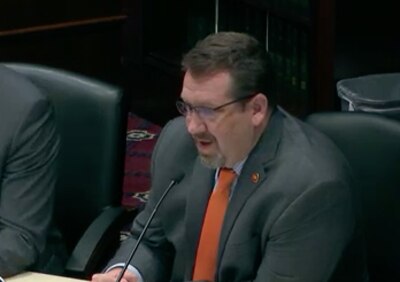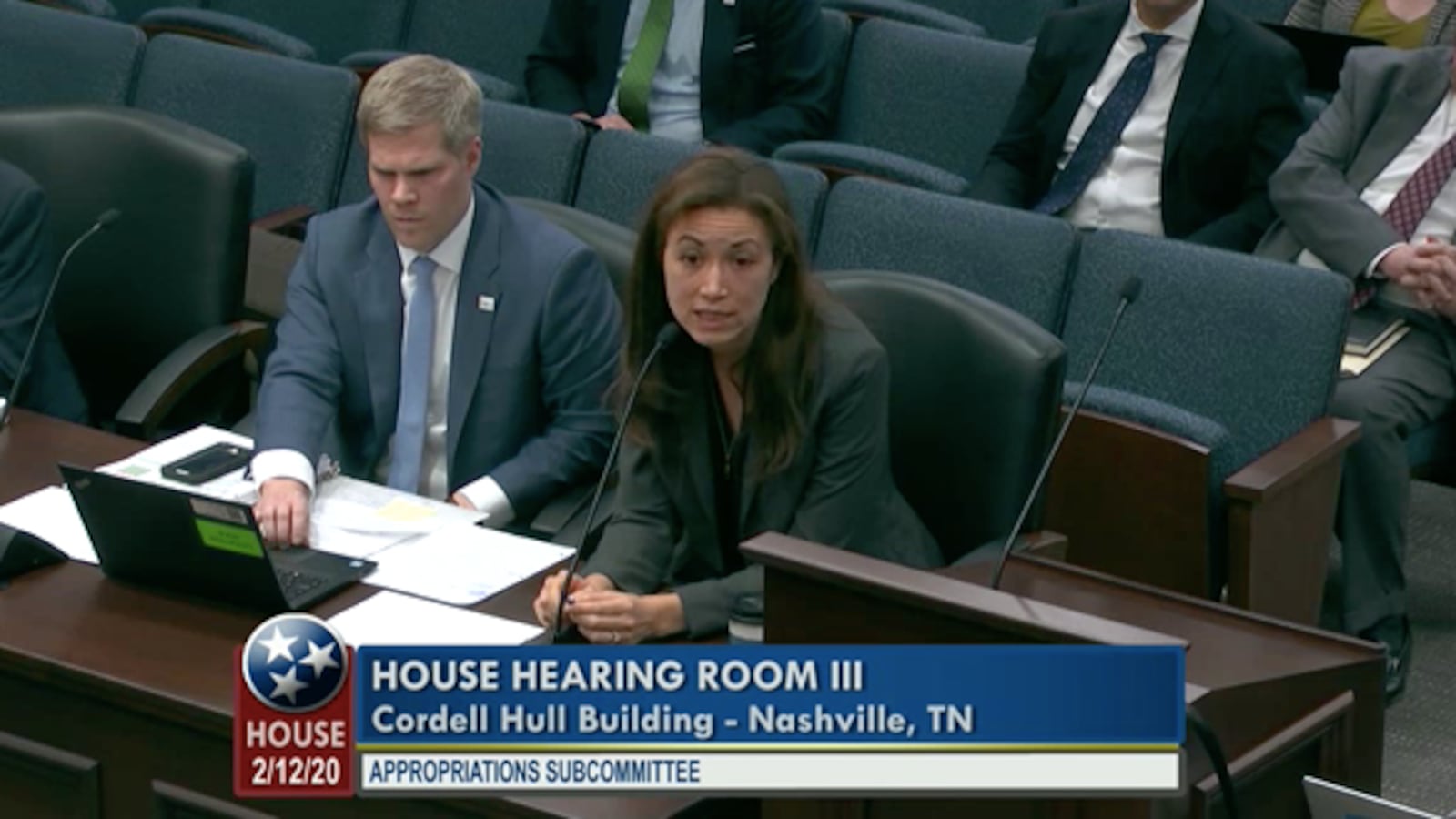Lawmakers who oversee the spending of Tennessee taxpayer money blasted the Department of Education Wednesday for its handling of a no-bid contract with ClassWallet, hired for $1.25 million a year to manage the state’s upcoming voucher program.
Commissioner Penny Schwinn and members of her team were grilled for almost two hours over the decision to bypass a competitive bid process to hire the Florida-based company — and for twice the amount budgeted for work this year on Gov. Bill Lee’s education savings account program.
It was the first time that multiple Republican lawmakers aired their frustrations over the GOP-backed voucher program, with one representative expressing regrets for voting for it.
Members of the House appropriations subcommittee also scolded the department for not bringing the contract before the legislature’s Fiscal Review Committee, or even answering that body’s multiple questions and emails before signing the agreement.
“Fiscal Review didn’t find out about this contract grant until Nov. 13 when it was published in Chalkbeat. Do you think that that’s acceptable?” asked Rep. Matthew Hill, the Jonesborough Republican who chairs the panel.
Apologizing for the poor communication, Schwinn referenced the department’s need to move quickly to roll out the program by the 2020-21 school year. The deadline is a year earlier than required by the 2019 law but was ordered last summer by the governor, who said he wanted to provide education choices for families as soon as possible.
“Certainly what we were looking at is when does this grant contract need to be executed so that children can be in seats in August,” the commissioner said.
Other lawmakers were still irked by the decision to speed up the launch.
“When we passed the ESA/voucher bill with many modifications and amendments, it was my understanding that that plan would not go into effect until August of ’21,” said Rep. Patsy Hazlewood, a Republican from Signal Mountain who voted for the legislation. “Who decided and what legislative authority moved the start date back on the legislation that we passed?”
“As commissioner, I am certainly responsible for the decision,” Schwinn answered.
The hearing was often tense as Hill — a vocal voucher supporter during fierce debates last spring — called up officials from the state’s procurement office, the comptroller’s office, and the finance department to address statements by staff for the education department.
Missing from the conversation were representatives for the governor. When pressed last month about ClassWallet’s selection, Lee told reporters that he was “comfortable” with the contract and that his office had consulted with the state attorney general’s office on the process.
“My direction to our department is that we get the right vendor. And if we have to make adjustments, we will, but that we get the right vendor,” Lee said.
Joanna Collins, an attorney for the education department, recounted the steps for selecting a vendor, including market research, before leaders concluded that only one company, ClassWallet, would be able to meet all of the state’s criteria.
“The state of Tennessee needed one comprehensive secure platform for families and schools that would be participating in the ESA program,” Collins said. “A critical component of this was that the system needed to meet the state’s technical and security requirements because families would be entering sensitive information (such as finances and disability status) about their child into the system.”
A frustrated Rep. Jeremy Faison said that’s not the way that government procurements are handled. At one point, he declared that he wished he had not voted for the controversial voucher bill. Not only did parliamentary maneuvering and arm-twisting used to pass the bill in the House look “sketchy,” he said, but the department’s process for hiring ClassWallet appeared suspicious.

“To the general public, it looks like you found a vendor, and then created a contract,” said Faison, a Republican from Cosby.
The cost was concerning, as well, since the legislature set aside only $771,300 in this year’s budget for voucher work. The ClassWallet contract is for $2.5 million for two years to manage online accounts and applications, with an option to extend the contract for three more years for up to $6.3 million.
“How does $750,000 which was approved by the legislature turn into $6,328,750, and where in the world did you get this money?” Hill asked Schwinn and her team.
Chief Financial Officer Drew Harpool said the department tapped into $1.5 million from Tennessee’s Career Ladder teacher pay program that began in the 1980s and has since expired. “These were unused funds,” he said.
“What legislative authority did you have to do that?” Hill asked.
Harpool deferred to the state’s finance department, with whom he worked to move the funds.
That response steamed Faison.
“That Career Ladder is for teacher pay and we robbed teacher pay,” he said. “We just decided to rob a pot of money that had nothing to do with the legislation that we passed.”
Faison went on: “You can’t do stuff like this and think there’s not consequences in the general public. I can’t stress how bad this looks for us.”
Coming to the department’s defense, Rep. Andy Holt suggested that criticism of the ClassWallet contract is an effort to undermine the governor’s education savings account program.
“I voted for ESA legislation and I don’t regret it one bit,” said the Dresden Republican. “I think we should all recognize that there is, there was, and there will continue to be opposition to the idea of supplying educational choice.”
Hill responded that the purpose of the hearing was “not to debate the validity” of vouchers or programs designed to give parents more education choices for their children.
“What we’re talking about are the finances, and we have a constitutional obligation of oversight to make sure that the monies are being spent properly,” Hill said.
He added: “When they ask for $750,000 and then spend $2.5 million without telling us — and when fiscal review asks for months for details on the financials of this grant/contract/whatever and gets the cold shoulder and gets no response whatsoever until after it’s already issued — those are real problems.”
Hill ordered the department to return before his panel on Feb. 19 and to provide members with advance documentation to show its “due diligence” for pursuing a contract with ClassWallet.
“We look forward to reading that next week,” he said.

